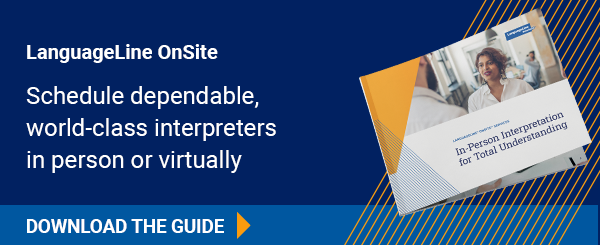Every interpreting experience is important and has unique requirements and requests. To ensure the very best outcomes, it is imperative that every session is treated with the utmost respect and accuracy. Professional onsite interpreters are mentored to handle situations, including sensitive conversations when interpreting between you and your limited English speaking, and deaf and hard-of-hearing patients.
In a face-to-face interpreting session when the patient, provider, and the interpreter are all physically present, the patient may be very uncomfortable and may have to share information that is difficult and embarrassing. They also may be very reluctant to allow another person in the room during examinations.
How should interpreters react when a patient starts discussing private or sensitive matters?
The Best Professional Onsite Interpreters Are Guided to Follow These Principles
The Patient Comfort Level Is Important
If the interpreter is comfortable, the patient will likely be comfortable. The patient may be uneasy and embarrassed about the conversation. The interpreter may be feeling the same. It’s important that the interpreter demonstrates confidence with no sudden, visible reaction to the information. The patient will begin to trust and feel more comfortable sharing the personal detailed account of their health issues.
Don’t Censor the Patient
No matter what information the patient discloses, the interpreter’s job is to always interpret their dialogue completely and accurately into the target language.
Interpreters should avoid editing, filtering, or polishing the information. If the patient’s being crude, the interpretation should reflect that crudeness. If the patient’s shying away from using graphic terms or even normal anatomical terms, the interpreter will not add them during interpretation.
Interpreters should strive to remain 100% transparent to the original spirit of the message.
Avoid Engaging in Conversations
An interpreter should never have conversations with patients when the provider is not present. This is particularly important when dealing with sensitive information. If the interpreter starts chatting with the patient in the waiting area, when the time comes for the patient to share the sensitive information with the provider, they may refrain from doing so — or if they do share the information, they may hold back and not share it entirely.
Respect Patient Privacy
When it comes to the medical examination, it is best for the interpreter to turn around, look elsewhere or, when available, go behind the curtain.
Most patients appreciate it when the interpreter takes the initiative to remove themself. It makes the patient feel more comfortable. Plus, the exam rooms are often small enough that you can still hear everything.
If an interpreter is in a situation where they must come closer to the patient or the provider to be able to hear well, an interpreter is guided to keep their eyes either on the floor or on the ceiling. The best interpreters imagine how they would feel if they were the patient.
Don’t Project Personal Biases
Even if the conversation between patient and provider goes against an interpreter’s principles or beliefs, avoid giving an opinion or advising the patient.
Interpreters will not interject into the matter. They will continue to help the patient communicate with the healthcare professionals and let them decide what the best course of action would be.
Expect the Unexpected
Professional interpreters gather as much information about every assignment as possible. Every session is unique and they are equipped to handle even the most sensitive conversations.
Interpreters are required to remain objective and stay calm so emotions don’t interfere. They focus on conveying the best equivalent terms into the target language allowing both parties to successfully communicate as though they were speaking the same language.
Onsite Interpreters Help You Deliver Outstanding Care
Skilled onsite interpreters provide the highest quality interpreting sessions ensuring your patients receive the outstanding care they deserve. They should be depended upon to arrive on time and be ready to partner with you, to enable communication in spoken languages and American Sign Language.
Learn more about how you can schedule onsite sessions with our professional interpreters.
About LanguageLine®
LanguageLine has been the world leader in innovative language-access solutions since 1982. The company sets the global standard for phone, video, and onsite interpreting, as well as translation of the written word. LanguageLine is trusted by more than 30,000 clients to enable communication with the limited English proficient, Deaf, and Hard of Hearing communities. LanguageLine provides the industry’s fastest and most dependable access to more than 35,000 professional linguists in 290-plus languages — 24 hours a day, seven days a week, 365 days a year. Please do not hesitate to contact us!

